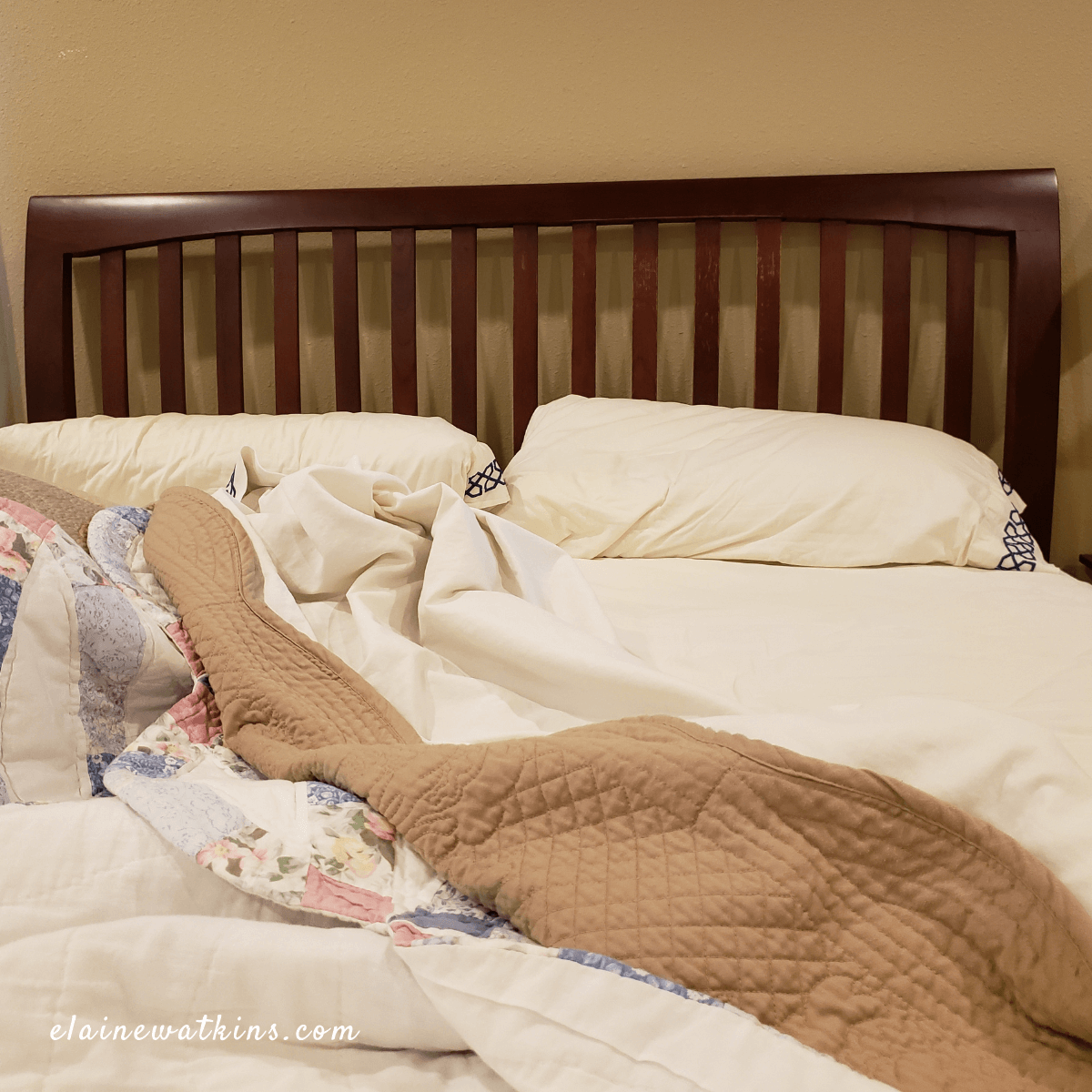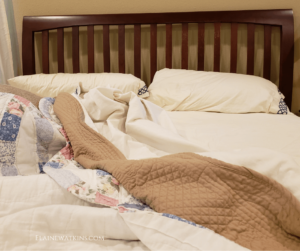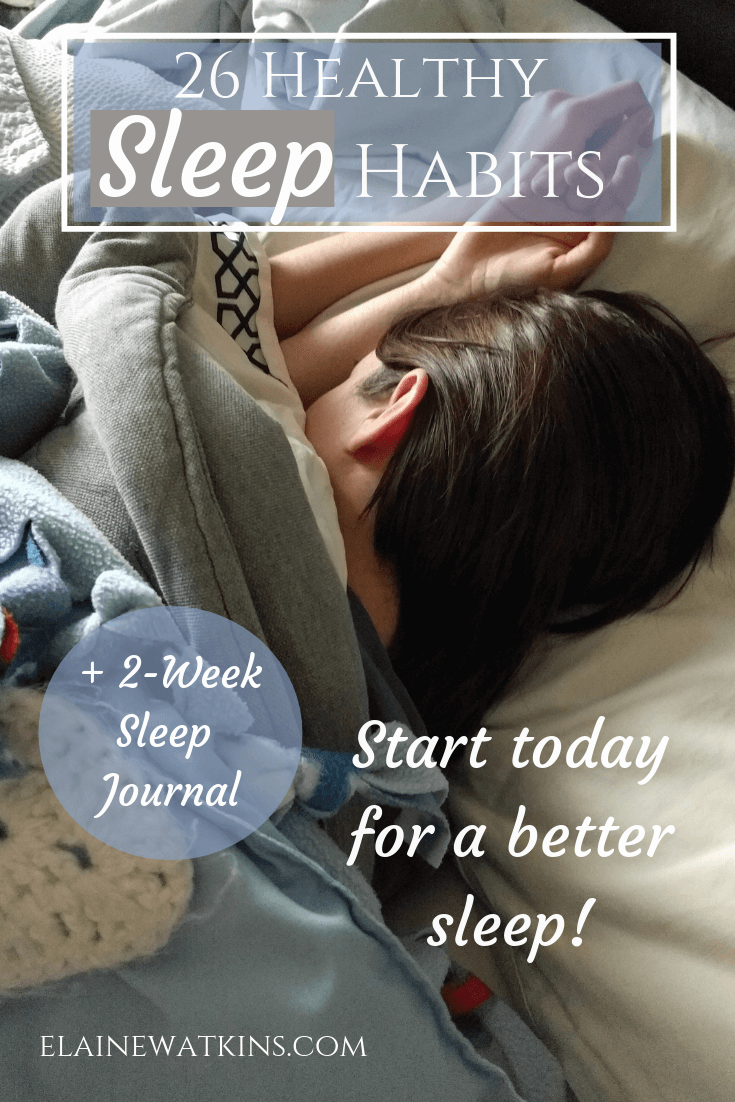Ready for a Good Night’s Sleep? Start Using This FREE Sleep Journal and Making Changes Today

Sometimes it feels like you will have a totally wasted day when there was an unsuccessful sleep the night before, so let’s talk strategies for a Successful Night’s Sleep! Who doesn’t want to enjoy better sleep?
I get it. I think we’ve all had those nights.
The day after a night where sleep wasn’t so restful really weighs down productivity, concentration, and mood too.
Yawn…
But when you consistently enjoy quality sleep, your body can do what it needs to do while you’re in sleep mode, in order for you to wake up refreshed, energetic, and enjoyably productive day. 
Working While You Sleep
There are several struggles that can be experienced when you are sleep deprived including:
- Lack of focus
- Hormone imbalances
- Mood swings
- Pain and inflammation
- Slower reaction times
- Limited learning and memory storage
- Increased accidents
- Heightened chronic disease risk
- Weight issues
- And these are just a few
And actually, the sleep process is really interesting. There are multiple stages of sleep with those stages repeating in cycles lasting approximately 80-110 minutes each throughout the night.
Throughout the sleep time, your hormones and neurotransmitters are rising and falling. Your immune system is strengthening, experiences of the day are being laid into memories, organs are detoxing, and more.
A lot of house cleaning is going on as toxins and debris are being moved to the exits and all is then being refreshed, restored, energized, and prepared for the upcoming day.
What is Enough for a Successful Night’s Sleep?
 I was listening to Dr. Dale Bredesen share during an interview recently about the importance of getting at least 7-8 hours of sleep every night as part of his strategy for avoiding and reversing Alzheimer’s. As an authority in neurological disorders, and Alzheimer’s in particular, he’s definitely someone worthy of attention.
I was listening to Dr. Dale Bredesen share during an interview recently about the importance of getting at least 7-8 hours of sleep every night as part of his strategy for avoiding and reversing Alzheimer’s. As an authority in neurological disorders, and Alzheimer’s in particular, he’s definitely someone worthy of attention.
And seriously…He’s not the only one.
Dr. Joseph Mercola points out that “most adults need about 8 hours of sleep per night to maintain good health”. Dr. Amy Myers suggests 10 p.m. to 6 a.m. or possibly 9-10 hours of sleep, if that’s what your body needs.
We’re all different, but experts generally suggest that 7-10 hours of consistent, restorative sleep is optimum.
So how many hours of sleep do you typically get each night? And what about your family members?
One simple way to shed some light on your sleep needs, that I’ve seen come up more than a few times, is to:
- wake up without the alarm over a few consecutive mornings (a weekend might be easiest)
- note what time you went to sleep the night before to determine how many hours you slept undisturbed
- count backwards that number of hours from the time you need to wake up during the weekdays
- adjust your routine and going-to-bed time to that newly determined time
Healthy sleep is impacted by what you eat and when, your workload, physical activity, stress, and relationships too.
 What Can Support Better Sleep?
What Can Support Better Sleep?
Your body functions in what is called a circadian rhythm. This rhythm is an established routine or schedule that’s tied to light and dark and signals when your body should complete certain functions or respond in certain ways within a 24-hour period.
The more consistent you can be with your sleep and wake times, as well as other areas that support good health, the more consistent your circadian rhythm is and, basically, the healthier you can be.
There are a number of suggestions coming from experts that you can consider incorporating throughout your day, in the evenings, and at bedtime to support a healthy circadian rhythm and a good night’s sleep.
Later in this article, I share some of what we’ve done personally, and some of the resources we have used along the way.
During the Day
- Establish a routine for wake and sleep times and stick to it (even on weekends)
- Get outside, open the curtains, or somehow get out in the natural light during the day
- Get exposure to morning light as soon after waking as possible
- Incorporate exercise and movement into your day 3 or more hours before your bedtime
- Eat clean, real food and limit/eliminate sugar and processed foods
- Drink clean water throughout the day
- Watch out for too much stress…especially in the evening

In the Evening
- Try to get outside to watch the sun set
- Establish a relaxing routine (maybe cut that stressful tv show or social media drama?)
- Enjoy a health-supporting dinner in a relaxed state to support digestion
- Aim to finish eating 3-4 hours before bedtime (watch out for too much sugar or caffeine)
- Avoid stimulating/stressful activities, responsibilities, or entertainment (paying bills, arguing, exercise/sports)
- Choose enjoyable and relaxing activities and entertainment (music, reading, sitting outside, relaxing walk, etc)
- Have some relaxing herbal tea
- Establish and enjoy a relaxing shower/bath routine (avoid extremely hot temperatures and choose soothing aromas from non-toxic resources)
- Consider aromatherapy (diffuser, sachet, etc) (avoid synthetic scents)
- Consider relaxing movement options
- Dim the lights (particularly those that emit a lot of blue light like LEDs and fluorescent)
- Limit or eliminate electronics in the evening
 At Bedtime
At Bedtime
- Establish a consistent, relaxing, sleep-supporting routine
- Create a relaxing and sleep-supporting environment in your bedroom
- Select a cool room temperature
- Diffuse relaxing essential oils (avoid synthetic scents)
- Consider something that creates a non-distracting white noise (if needed)
- Eliminate or cover overnight light sources in your bedroom
- Eliminate clutter in your bedroom that might raise your stress-level before bed
- Consider the blessings in your life, forgive, and experience gratitude
- Keep work, bills, etc. out of your bedroom to avoid non-sleep-supporting thoughts before bed
- Keep a notepad by your bedside to write down anything important that comes up to consider the next day and avoid dwelling on at bedtime
What We’ve Done
We’ve had varying degrees of success and consistency with the individual tips included here, and, of course, better sleep isn’t an isolated improvement with isolated and unique strategies. The reality is as you make overall changes that support your health, you usually notice improvement in many areas including sleep.
But I would say that the top 3 sleep-specific changes that we consciously made to enjoy a successful night’s sleep regularly are:
- going to bed at a consistent time – we determined our “lights out” bedtime by recognizing the time we needed to wake most days and then counting back 7 hours as a minimum sleep goal but with a preferred goal to be snoozing by 10:30 p.m. to optimize all the detox and rebuilding that goes on overnight
- avoiding heavy meals and high sugar snacks in the evenings so we don’t go to bed uncomfortable or wired
- choosing schedules, activities, chores, etc. as much as possible, in order to be done and relaxing at home (and maybe heading to bed early by about 8:30-9 p.m.
Source List:
I thought it might be helpful to include a list of some of the tools that we’ve used personally for better sleep:
- Sleep Tracker – You can click here for my FREE Sleep Journal/Tracker printable
- Stainless Steel Water Bottle (25 oz) – We have Mira water bottles-easy to track how much we’re drinking + they’re tough and lidded
- Herbal Tea – we enjoy Traditional Medicinals Cup of Calm, Chamomile-Lavender, Nighty Night – there are others so you might want to look at the others too once you’re on Amazon
- Essential Oil Diffuser – I use this diffuser a lot because it was a good price, easy to use, and quiet
- We use www.justgetflux.com to automatically dim our screen lights (some people also use blue light blocking glasses to limit blue light exposure)
- Programmable Thermostat – This has been helpful to preset the thermostat to cool down a few degrees a little before bedtime and then return to our daytime temperature a little before we wake
- White Noise Machine – This is a link to the noise machine we have but there are many others so you might want to look around
Additional Resources In Case You’re Interested
Here are links to other posts that can support you in some of these changes:
Here are 4 great, short videos with additional information:
- Yuri Elkaim about circadian rhythm and the impact of light on sleep
- Mama Natural about using blue blocking glasses
- Dr. Josh Axe about using essential oils to support sleep
What Will You Incorporate for a Successful Night’s Sleep?
Thinking about incorporating some of these suggestions into what you are currently doing for yourself and your family?
Of course we all have different households with different possibilities and challenges. You are the best judge of what changes you can make for you and your family or maybe how fast or in what order you can make any combination of changes.
Healthy sleep is such a Huge part of your overall health, and it’s such an interesting part of the adventure we are on as we make health-supporting changes.
For me, three changes that had the biggest impact on my sleep were:
- getting more physically active during the day
- drinking more water (particularly trying to hit my goal before 8 p.m.)
- avoiding stressful discussions, entertainment, and activities as much as possible in the evenings
Are you already incorporating any of these recommendations?
Are you thinking you want to change or add to your day or night routines for better sleep? 
Let me know in the comments what you decide to do and how it goes.


Thanks for this Elaine. There are definitely some elements here for me to add to my routine which will surely help me get a better sleep. I especialy like your tip to get outside to watch the sunset – what a lovely thing to add to your evening routine!
Hi Jayne.
I’m so glad you found information here that’s helpful.
Yes. Getting outside is really helpful for me too…for sleep but also because it’s just so beautiful!
Thank you.